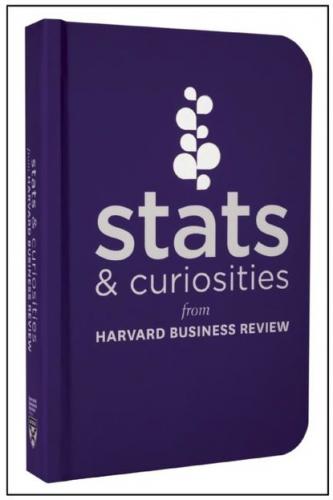stats
& curiosities
from
HARVARD BUSINESS REVIEW
written and edited by
ANDREW O’CONNELL
HARVARD BUSINESS REVIEW PRESS
BOSTON, MASSACHUSETTS
Copyright 2013 Harvard Business School Publishing
All rights reserved
No part of this publication may be reproduced, stored in or introduced into a retrieval system, or transmitted, in any form, or by any means (electronic, mechanical, photocopying, recording, or otherwise), without the prior permission of the publisher. Requests for permission should be directed to [email protected], or mailed to Permissions, Harvard Business School Publishing, 60 Harvard Way, Boston, Massachusetts 02163.
Library of Congress Cataloging-in-Publication Data
O’Connell, Andrew (Business writer)
Stats and curiosities : from Harvard business review / written and edited by Andrew O’Connell.
pages cm
ISBN 978-1-4221-9631-1 (alk. paper)
1. Success in business. 2. Selling–Psychological aspects. I. Harvard business review. II. Title.
HF5386.O248 2013
650.1–dc23
2013018855
contents
introduction: curiouser and curiouser
mysteries of the human brain
bad behavior, good behavior
to your health
the working world
gender gaps
america the statistical
economic realities
the arc of life
stats you can use
sources
acknowledgments
about the author
introduction: curiouser and curiouser
Someone studied that? Someone actually studied the relationship between company performance and the width of the CEO’s face? That was my first response on reading an academic paper on leaders’ facial dimensions. I often react that way when I encounter the more unusual studies in out-of-the-way journals. Someone really estimated my likelihood of dying in the week after I get a bonus? Someone actually studied the effect of organic food on my moral judgments? Someone calculated the percentage of Prius drivers who ignore pedestrians in crosswalks?
But in four years of writing the Daily Stat, Harvard Business Review’s online digest of reports from the front lines of research in business, economics, and psychology, I’ve come to appreciate the breadth and depth of the topics being examined in laboratories and field studies around the globe.
For one thing, many of the findings published in the Daily Stat and compiled in this book turn out to be surprisingly useful: Background noise and a glimpse of green can make you more creative. Two-person teams are quicker than four-person teams.
Other stats are entertainingly odd: A taste of sugar gives people greater self-control. Disgust makes people more receptive to the new.
Most important, the data tells us a story about who we are: Single male CEOs take bigger financial risks in order to appear more attractive. Better-educated workers are less satisfied with their lives. High-status individuals are more likely to believe that people are smiling at them. There are two main messages in all this: Even in a high-tech age, we integrate our most human foibles and vulnerabilities into our work. And Prius drivers should watch where they’re going.
—Andrew O’Connell
mysteries
of the
human
brain
We start at the source, with an exploration of the nature of the mind. The brain, of course, is responsible for our greatest achievements and oddest behaviors, and, for better or worse, we bring it with us to the office every day. There we let it loose to do all the things it has been doing since we evolved as humans, such as seeking advantage over our coworkers and misinterpreting the world. On a product-safety note, Margaret Neale of Stanford and Scott Wiltermuth of the University of Southern California point out in this chapter that reading too much useless information makes you 46% less likely to think clearly, so as you peruse these stats, please read responsibly.
high status gives people delusions of approval
Research subjects who had been primed to think of themselves as having elevated status reported seeing 19% more smiles on the faces of people who had judged their work than subjects who considered themselves to have low status, say Nathan C. Pettit of NYU and Niro Sivanathan of London Business School. That’s because a person’s status colors his or her perceptions of others’ approval. Thus it seems evident that of all the rewards for achievement—recognition, income, promotion—the most valuable is the high-status mind-set, the researchers say.
powerful people think they’re taller
People who were asked to summon up memories of being powerful judged themselves to be an average of 6 inches taller, in comparison with a pole, than people who were asked to remember being powerless, say Michelle M. Duguid of Washington University and Jack A. Goncalo of Cornell University. Moreover, being physically elevated makes a person both feel powerful and seem powerful to others, the researchers say.
men with shaved heads are perceived as bigger and stronger
Shaven-headed men seen in photographs were perceived as an inch taller and 13% stronger than men with full heads of hair, according to an experiment reported by the Wall Street Journal. Albert Mannes of The Wharton School says he conducted his study after noticing that he was treated with greater deference after shaving off his hair. His research shows that men with shaved heads are seen as more dominant than men with full hair, and men with thinning hair are seen as the least powerful of all.
consumers are repelled by worn-out money and want to spend it
People who were given worn-out $20 bills spent 82% more of the money than consumers who were given four crisp $5 bills, reversing the expected “denomination effect,” which typically leads people to spend less from larger-denomination bills, say Fabrizio Di Muro of the University of Winnipeg and Theodore J. Noseworthy of the University of Guelph, both in Canada. People tend to be disgusted by worn bills and want to get rid of them because of presumed contamination from other people, the researchers found.
pain makes you indulge afterward
Research participants who had been induced to plunge their hands into ice water subsequently took 73% more pieces of candy from a bowl than those who hadn’t experienced pain, says a team led by Brock Bastian of
